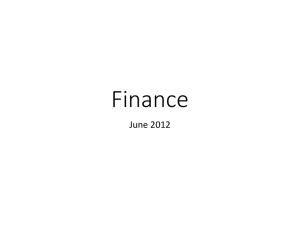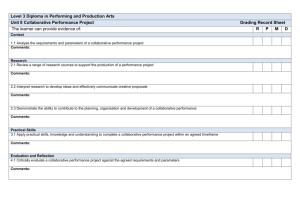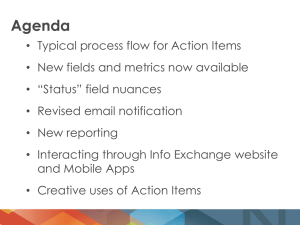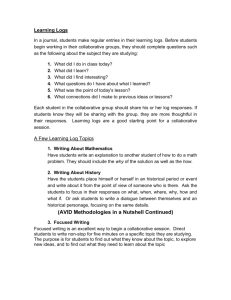Open Government Data Initiative Colombia
advertisement
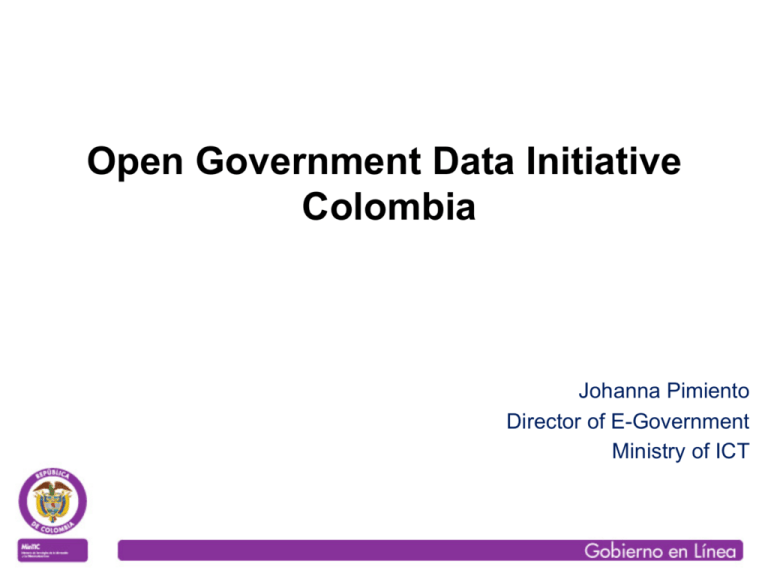
Open Government Data Initiative Colombia Johanna Pimiento Director of E-Government Ministry of ICT Outline 1 Ask people 2 A flexible approach 3 Some achievements 4 New challenges E-Government Strategy Efficiency and Collaboration Government agencies, citizens, the private sector and the academy generate value-added services from public data Transparency Accountability Citizen Participation Promote citizen participation using electronic media Competitiveness and Quality of life New business models for public administration Asking People 2010: Preliminary Survey (Citizens) ¿Which type of services would you like to have from public agencies? 69% 67% 63% 63% Education Health Utilities Employment 2011: Building up a flexible approach Organiza1onal Budget Framework E-­‐Gov E-­‐Gov Roadmap Initial 2012 Identification of data to be opened Pilots and first data sets released (Central level) Prototype of catalogs (Data and Apps) Sporadic collaborative events Monitoring agencies Basic 2013 Advanced 2014 Improved 2015 Analysis and prioritization of data sets/feedback from citizens and organizations Data responding to citizens´ needs Sustainability of best applications Release of highimpact data sets/The local level is involved Quality assurance Continuous innovation Collaboration platforms Semantic web Massive collaborative events Public/private cooperation Central and local catalogs Collaborative events (Targeted) Monitoring the use of data Key performance indicators Impact assessment Opening circle Data Inventory Identify Incentives Events Direct upload Webservice Reference Transfer Exploit Analyze Publish Prioritize Unclassified? Unreserved? Non-Confidential? Citizens demand Impact Difficulty Structure Metadata Some achievements Some achievements W3C Open Data Index Keep monitoring Third parties Citizens Which type of government apps would you like to have? In which areas are you keen to develop apps based on public information? 72% Health 72% Education 64% Education 64% Health 45% Employment 45% Administrative procedures 29% Housing 29% Entertainment 28% Administrative procedures 28% Environment The new challenges Emerging barriers… • • • • • Legal framework Particular information business models Developers business models Incentives for opening and re-use Identification of value-added data This year… • • • • • 4 national collaborative events (Hackatons) More than 100 Mobile Apps targeting social services (Education, Health, Employment, Housing) Training to public agencies Release of high-impact data and according to citizens demand Encouraging the use of data by third parties Some lessons • The Open Data model in Colombia provides a framework for data opening in a structured and organized manner, establishing balance and sustainability between supply and demand of data. • Added value must be obtained from solutions that meet citizens’ needs and agencies' services. Some lessons • Complexity perceived by public agencies regarding the openness process is one of the main barriers for the model implementation. • Those challenges are mainly related to civil servants behavior – Fear of losing control over data – Legal responsibility for publishing data – Concern and distrust about third parties which may market the information.


